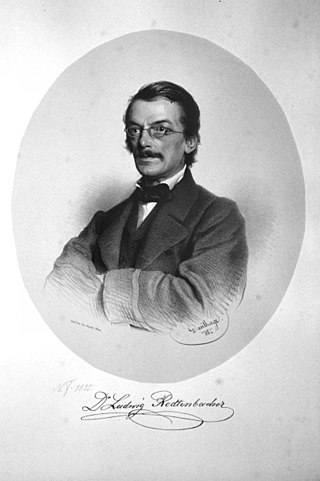
The University of Vienna is a public research university located in Vienna, Austria. Founded by Duke Rudolph IV in 1365, it is the oldest university in the modern German-speaking world and among the largest institutions of higher learning in Europe. The university is associated with 16 Nobel Prize winners and has been the home to many scholars of historical and academic importance.

Vienna is the capital, largest city, and one of nine provinces of Austria. Vienna is Austria's most populous city and its primate city, with about two million inhabitants, and its cultural, economic, and political center. It is the sixth-largest city proper by population in the European Union and the largest of all cities on the Danube river.

Christa Ludwig was a German mezzo-soprano and sometime dramatic soprano, distinguished for her performances of opera, lieder, oratorio, and other major religious works like masses, passions, and solos in symphonic literature. Her performing career spanned almost half a century, from the late 1940s until the early 1990s.

Vienna has been an important center of musical innovation. 18th- and 19th-century composers were drawn to the city due to the patronage of the Habsburgs, and made Vienna the European capital of classical music. Joseph Haydn, Wolfgang Amadeus Mozart, Ludwig van Beethoven, Franz Schubert and Johann Strauss II, among others, were associated with the city, with Schubert being born in Vienna. During the Baroque period, Slavic and Hungarian folk forms influenced Austrian music. Vienna's status began its rise as a cultural center in the early 16th century, and was focused on instruments including the lute.

Ludwig Anzengruber was an Austrian dramatist, novelist and poet. He was born and died in Vienna, Austria.

Otto Wilhelm Fischer was an Austrian film and theatre actor, a leading man of West German cinema during the Wirtschaftswunder era of the 1950s and 1960s.

TheAcademy of Fine Arts Vienna is a public art school in Vienna, Austria.

Austrian culture has been influenced by its past and present neighbours: Germany, Hungary, Italy, Slovenia, and Bohemia.

Ludwig Redtenbacher was an Austrian doctor and entomologist mainly interested in beetles.

CarlJoseph Millöcker, was an Austrian composer of operettas and a conductor. He was born in Vienna, where he studied the flute at the Vienna Conservatory. While holding various conducting posts in the city, he began to compose operettas. The first was Der tote Gast, an operetta in one act, premiered in 1865 with libretto by Ludwig Harisch, after the novel by Heinrich Zschokke.

Ludwig Heinrich Edler von Mises was an Austrian-American Austrian School economist, historian, logician, and sociologist. Mises wrote and lectured extensively on the societal contributions of classical liberalism and the power of consumers. He is best known for his work on praxeology studies comparing communism and capitalism.

Archduke Ludwig Viktor Joseph Anton of Austria was the youngest child of Archduke Franz Karl of Austria and his wife Princess Sophie of Bavaria, and as such was the younger brother of Emperor Franz Joseph I. He had a military career, as was usual for archdukes, but did not take part in politics. He was openly homosexual and declined to marry princesses who were sought for him. He is well-known for his art collection and patronage as well as philanthropy.

Mumok is a museum in the Museumsquartier in Vienna, Austria.

Ludwig Schwarz, S.D.B. is the Catholic bishop of the Diocese of Linz, Austria.

Austria, formally the Republic of Austria, is a landlocked country in Central Europe, lying in the Eastern Alps. It is a federation of nine provinces, one of which is the capital, Vienna, the most populous city and province. Austria is bordered by Germany to the northwest, Czechia to the north, Slovakia to the northeast, Hungary to the east, Slovenia and Italy to the south, and Switzerland and Liechtenstein to the west. The country occupies an area of 83,871 km2 (32,383 sq mi) and has a population of 9 million.

Heinrich Mache was an Austrian physicist. He won the Haitinger Prize of the Austrian Academy of Sciences in 1915.
The Haitinger Prize of the Austrian Academy of Sciences was founded in 1904 by the chemist and factory director, Ludwig Camillo Haitinger (1860–1945), who created the award in honor of his father, Karl Ludwig Haitinger. From 1905 to 1943 it was awarded every year, for "studies in chemistry and physics that proved to be of great practical use for industrial applications". The prize was awarded for the last time in the year 1954.

Michael Ludwig is an Austrian politician of the Social Democratic Party (SPÖ). Since May 2018, he has been Mayor and Governor of Vienna, the capital and largest city of Austria. Since January 2018, he has also served as chairman of SPÖ Vienna. Prior, he was City Councillor for Housing, Construction, and Urban Renewal from January 2007 until his election as mayor. He was also Second Deputy Mayor and Governor of Vienna from March 2009 to October 2010.